Mises, Ludwig von. Human Action: A Treatise on Economics
Подождите немного. Документ загружается.

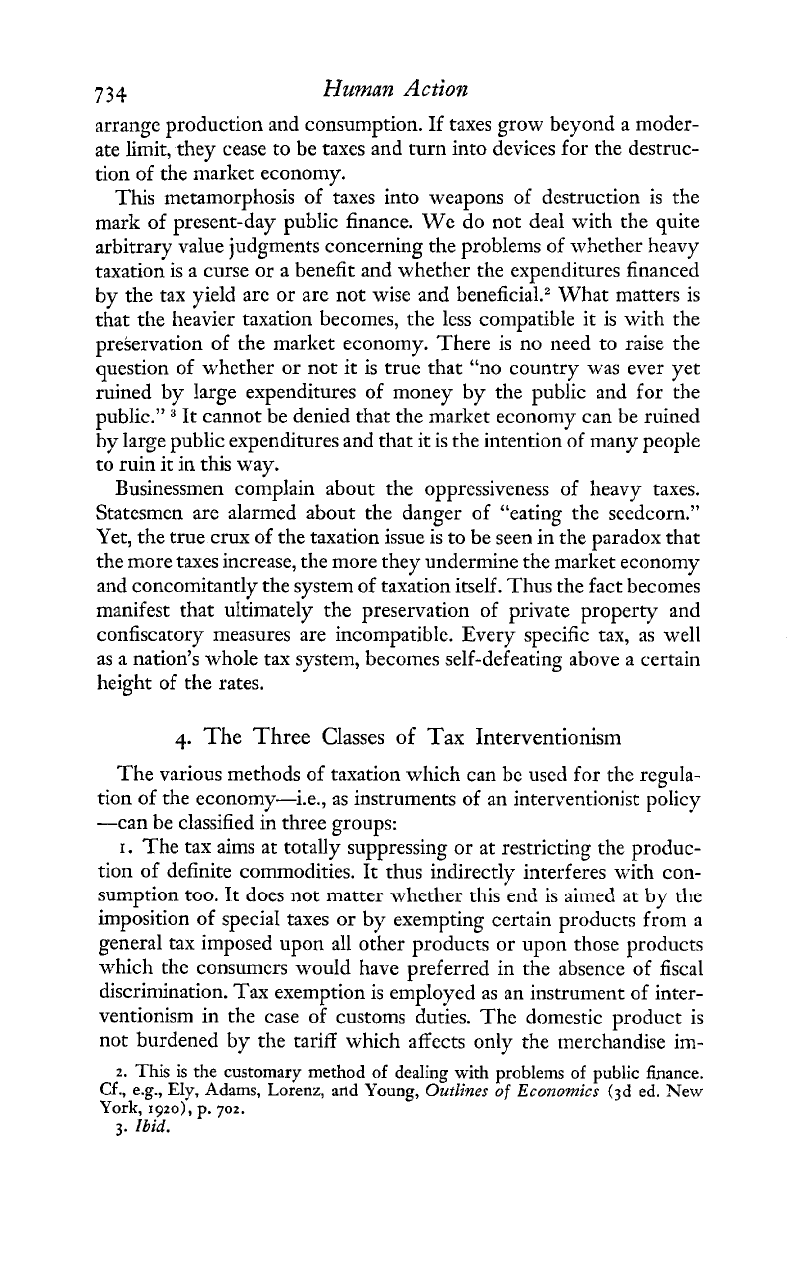
7
34
Human
Action
arrange production and consumption. If taxes grow beyond a moder-
ate limit, they cease to be taxes and turn into devices for the destruc-
tion of the market economy.
This metamorphosis of taxes into weapons of dcstruction is the
mark of prescnt-day public finance.
We
do not deal with the quite
arbitrary value judgments concerning the problems of whether heavy
taxation is a curse or a benefit and whether the expenditures financed
by the tax yield arc or are not wise and benefi~ial.~ What matters is
that the heavier taxation becomes, the lcss compatible it is with the
preservation of the market economy. There is no need to raise the
question of whether or not it is true that "no country was ever yet
ruined by large expenditures of money by the public and for the
public."
"t
cannot be denied that the market economy can be ruined
by large public expenditures and that it is the intention of many people
to ruin it in this way.
Businessmen complain about the opprcssivcness of heavy taxes.
Statesmen are alarmed about the danger of "eating the seedcorn."
Yet, the true crux of the taxation issue is to be seen in the paradox that
the more taxes increase, the more they undermine the market economy
and concomitantly the system of taxation itself. Thus the fact becomes
manifest that ukimately the preservation of private property and
confiscatory measures are incompatible. Every specific tax, as well
as a nation's whole tax system, becomes self-defeating above a certain
height of the rates.
4.
The Three Classes of
Tax
Interventionism
The various methods of taxation which can he used for the regula-
tion of the economy-i.e., as instruments of
an
interventionist policy
-can be classified in three groups:
I.
The tax aims at totally suppressing or at restricting the produc-
tion
of
definite commodities. It thus indirectly interferes with con-
sumprim
too.
It
does not matter whether this ed
is
aimed
at
by
tile
imposition of speciaI taxes or by exempting certain products from a
general tax imposed upon all other products or upon those products
which the consumcrs would have preferred in the absence of fiscal
discrimination. Tax exemption is employed as an instrunlent of inter-
ventionism in the case of customs duties. The domestic product is
not burdened by the tariff which affects only the merchandise im-
z.
This
is
the customary method of dealing with problems of public finance.
Cf., e.g., Ely, Adams, Lorenz, arid Young,
Outlines
of
Economics
(3d
ed.
New
York,
I~o),
p.
702.
3.
Ibid.
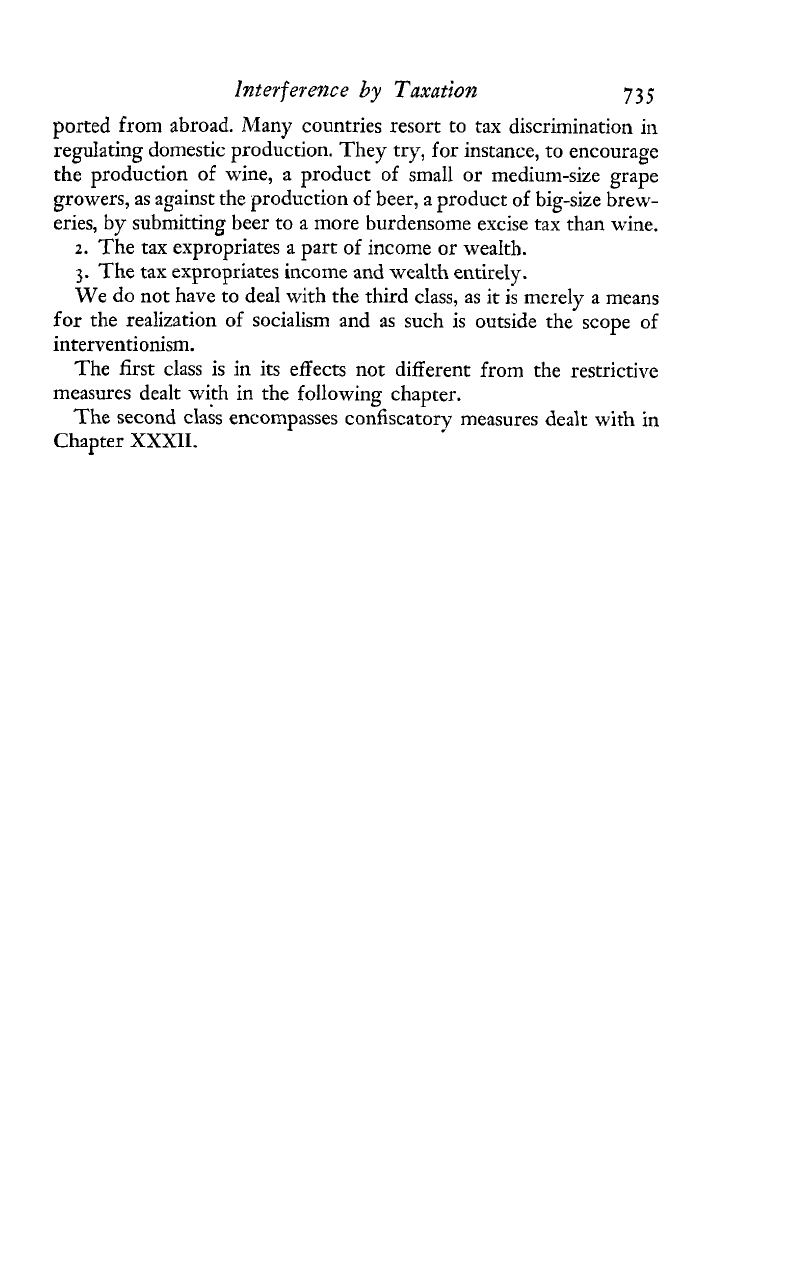
Interference
by
Taxation
735
ported from abroad. Many countries resort to tax discrimination in
regulating domestic production. They try,
for
instance, to encourage
the production of wine, a product of small or medium-size grape
growers, as against the production of beer, a product of big-size brew-
eries,
by
submitting beer to
a
more burdensome excise tax than wine.
2.
The tax expropriates a part of income or weaIth.
3.
The tax expropriates income
and
wealth entirely.
We
do not have to deal with the third class, as it is merely a means
for the realization of socialism and as such is outside the scope of
interventionism.
The
first class is
in
its effects not different from the restrictive
measures dealt with in the following chapter.
The
second class encompasses confiscatory measures dealt with in
Chapter
XXXII.
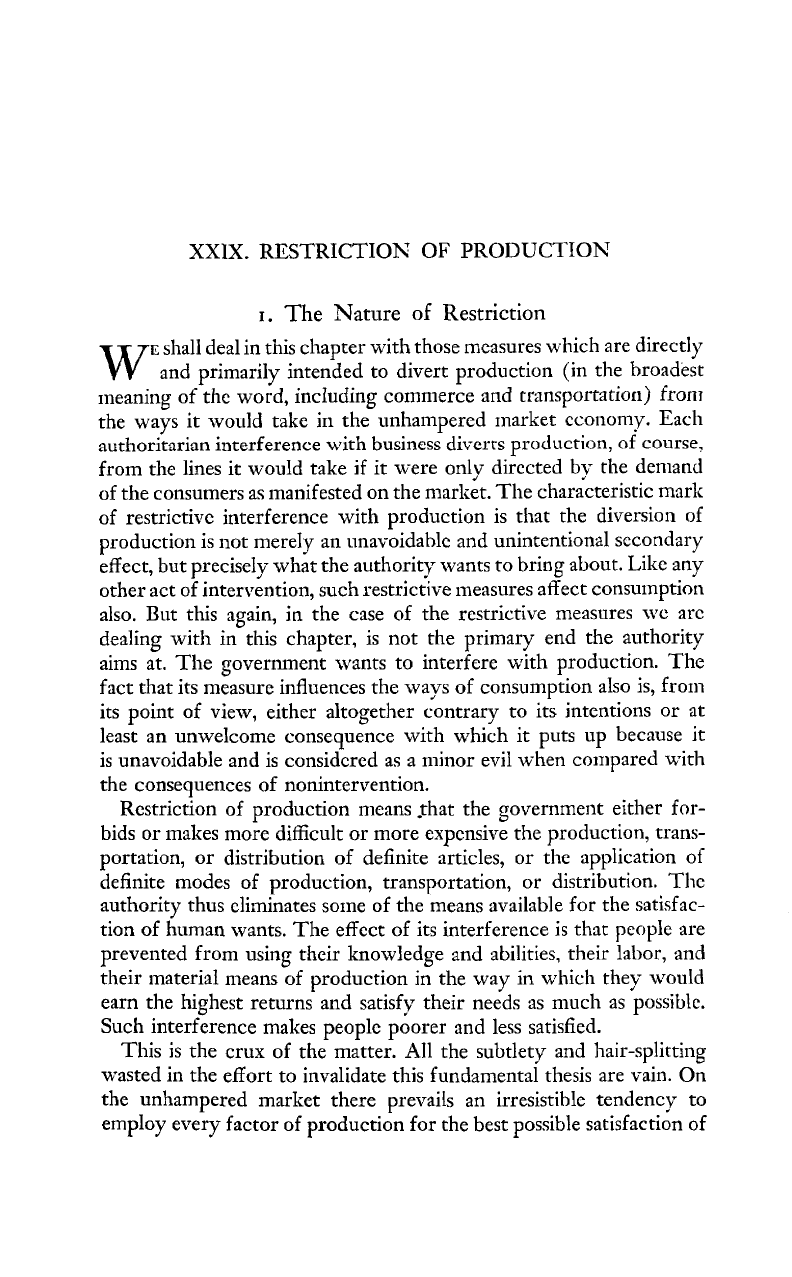
XXIX.
RESTRICTION OF PRODUCTION
I.
The
Nature of Restriction
E
shall deal in this chapter with those measures which are directly
W
and primarily intended to divert production (in the broadest
meaning of the word, including commerce and transportation) from
the ways it would take in the unhampered market economy. Each
authoritarian interference with business diverts production,
of
course.
from the lines it would take
if
it were only directed
by
the demand
of the consumers as manifested on the market. The characteristic mark
of restrictive interference with production is that the diversion of
production is not merely an unavoidable and unintentional secondary
effect, but precisely what the authority wants to bring about. Like any
other act of intervention, such restrictive measures affect consumption
also. But this again, in the case of the restrictive measures wc arc
dealing with in this chapter, is not the primary end the authority
aims at. The government wants to interfere with production. The
fact that its measure influences the ways of consumption also is, from
its point of view, either altogether contrary to its intentions or at
least an unwelcome consequence with which
it
puts up because it
is unavoidable and is considered as a minor evil when compared with
the consequences of nonintervention.
Restriction of production means >hat the government either for-
bids or makes more difficult or more expensive the production, trans-
portation, or distribution of definite articles, or the application of
definite modes of production, transportation, or distribution. The
authority thus eliminates some of the means available for the satisfac-
tion of human wants. The effect of its interference is that people are
prevented from using their knowledge and abilities, their labor, and
their material means of production in the way in which they would
earn the highest returns and satisfy their needs as much as possible.
Such interference makes people poorer and less satisfied.
This is the crux of the matter. All the subtlety and hair-splitting
wasted in the effort to invalidate this fundamentai thesis are vain. On
the unhampered market there prevails an irresistible tendency to
employ every factor of production for the best possible satisfaction of
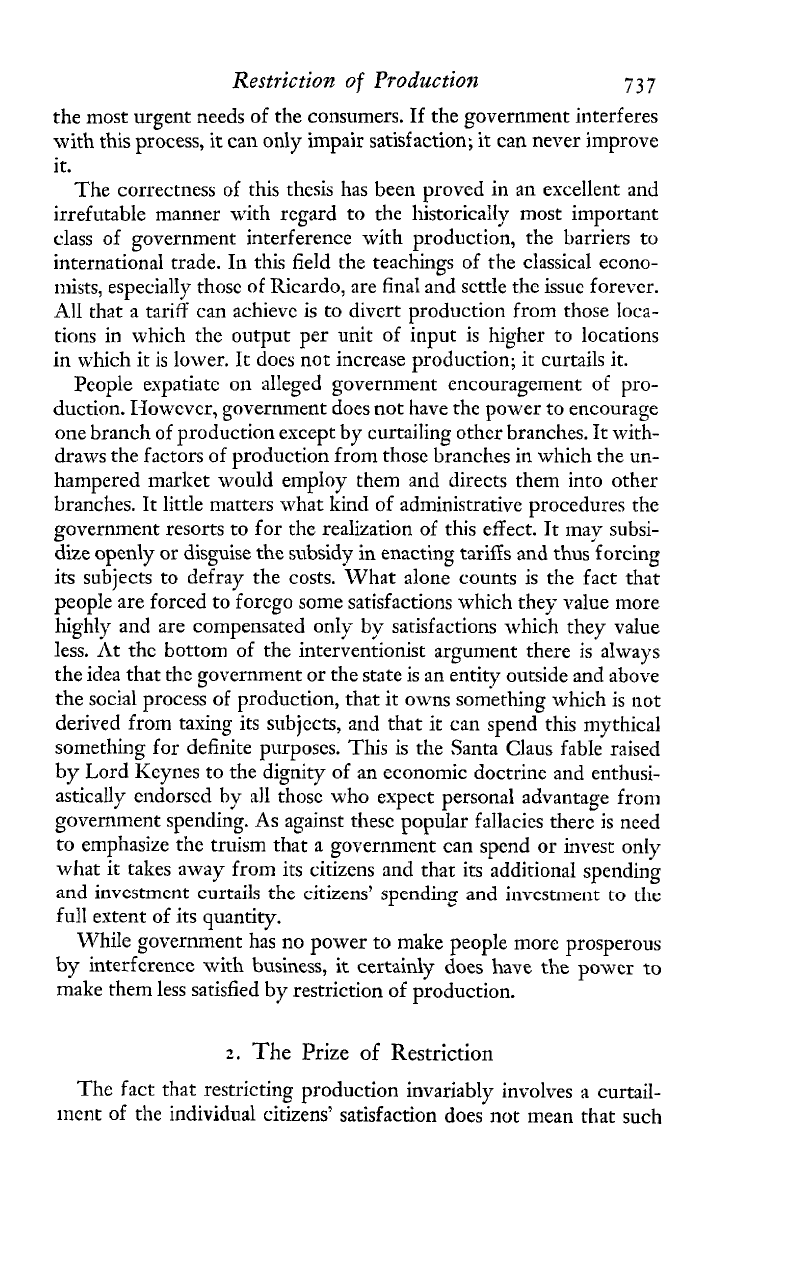
Restriction of Production
7
3
7
the most urgent needs of the consumers. If the government interferes
with this process, it can only impair satisfaction; it can never improve
it.
The correctness of this thesis has been proved in an excellent and
irrefutable manner with regard to the hjstorically most important
class of government interference with production, the barriers to
international trade. In this field the teachings of the classical econo-
mists, especially thosc of Ricardo, are final and settle the issue forever.
All that a tarifi can achieve is to divert production from those loca-
tions in which the output per unit of input is higher to locations
in which it is lower. It does not increase production; it curtails it.
People expatiate on alleged government encouragement of pro-
duction. Howcvcr, government does not have the power to encourage
one branch of production except by curtailing other branches. It with-
draws the factors of production from thosc branches in which the un-
hampered market would employ them and directs them into other
branches. It little matters what kind of administrative procedures the
government resorts to for the realization of this effect. It may subsi-
dize openly or disguise the mbsidy in enacting tariffs and thus forcing
its subjects to defray the costs. What alone counts is the fact that
people are forced to forego some satisfactions which they value more
highly1 and are compensated only by satisfactions which they value
less.
;lt
the bottom of the interventionist argument there is always
the idea that the government or the state is an entity outside and above
the social process of production, that it owns somkhing which is not
derived from taxing its subjects, and that it can spend this mythical
something for definite purposes. This is the Santa Claus fable raised
by Lord Keynes to the dignity of an economic doctrine and enthusi-
astically endorsed
by
all thosc who expect personal advantage from
government spending. As against these popular fallacies there is need
to emphasize the truism that a government can spend or invest only
what it takes away from its citizens and that its additional spending
and investment curtails the citizens' spending and investment to the
full extent of its quantity.
While government has no power to make people more prosperous
by
interference with business, it certainly does have the power to
make them less satisfied by restriction of production.
r.
The
Prize
of
Restriction
The fact that restricting production invariably involves a curtail-
ment
of
the individual citizens' satisfaction does not mean that such
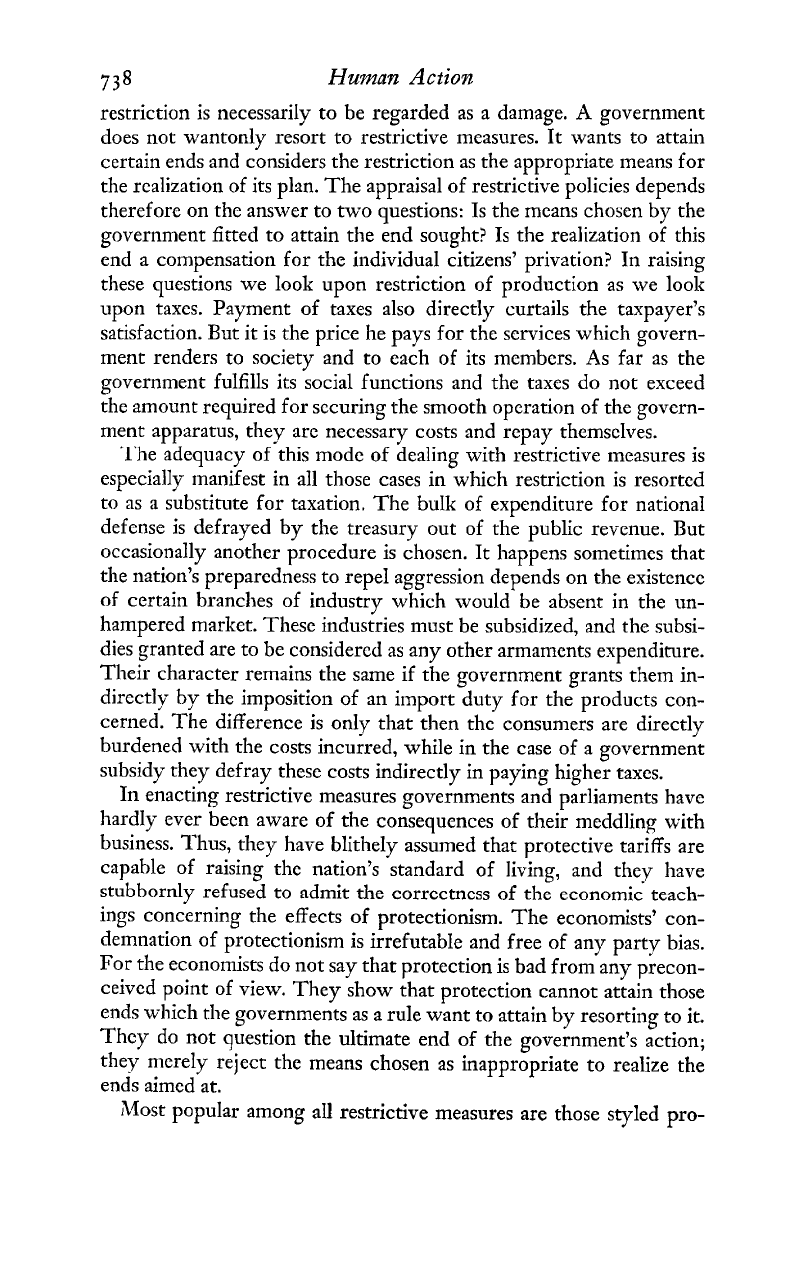
738
Human
Action
restriction is necessarily to be regarded as a damage.
A
government
does not wantonly resort to restrictive measures. It wants to attain
certain ends and considers the restriction as the appropriate means for
the realization of its plan. The appraisal of restrictive policies depends
therefore on thc answer to two questions: Is the mcans chosen by the
government fitted to attain the end sought? Is the realization of this
end a compensation for the individual citizens' privation? In raising
these questions we look upon restriction of production as we look
upon taxes. Payment of taxes also directly curtails the taxpayer's
satisfaction. But it is the price he pays for the services which govern-
ment renders to society and to each of its mcmbers. As far as the
government fulfills its social functions and the taxes do not exceed
the amount required for securing the smooth operation of the govern-
ment apparatus, they arc necessary costs and repay themselves.
The adequacy of this mode of dealing with restrictive measures is
especially manifest
in
all those cases in which restriction is resorted
to as a substitute for taxation. The bulk of expenditure for national
defcnse is defrayed by the treasury out of the public revenue. But
occasionally another procedure is chosen. It happens sometimes that
the nation's preparedness to repel aggression depends on the existence
of certain branches of industry which would be absent in the un-
hampered market. These industries must be subsidized, and the subsi-
dies granted are to be considered as any other armaments expenditure.
Their character remains the same if the government grants them in-
directly by the imposition of an import duty for the products con-
cerned. The difference is only that then the consumers are directly
burdened with the costs incuired, while in the case of a government
subsidy they defray these costs indirectly in paying higher taxes.
In enacting restrictive measures governments and parliaments have
hardly ever been aware of the consequences of their meddling with
business. Thus, they have blithely assumed that protective tariffs are
capable of raising the nation's standard of living, and they have
stohhardy
ref~sed
ts
ad~it the
correcmess
of
the
ezoiiomic teach-
ings concerning the effects of protectionism. The economists' con-
demnation of protectionism is irrefutable and free of any party bias.
For the economists do not say that protection is bad from any precon-
ceived point of view. They show that protection cannot attain those
ends which the governments as a rule want to attain by resorting to it.
Thcy do not question the ultimate end of the government's action;
they nlerely reject the means chosen as inappropriate to realize the
ends aimed at.
Most popular among all restrictive measures are those styled pro-
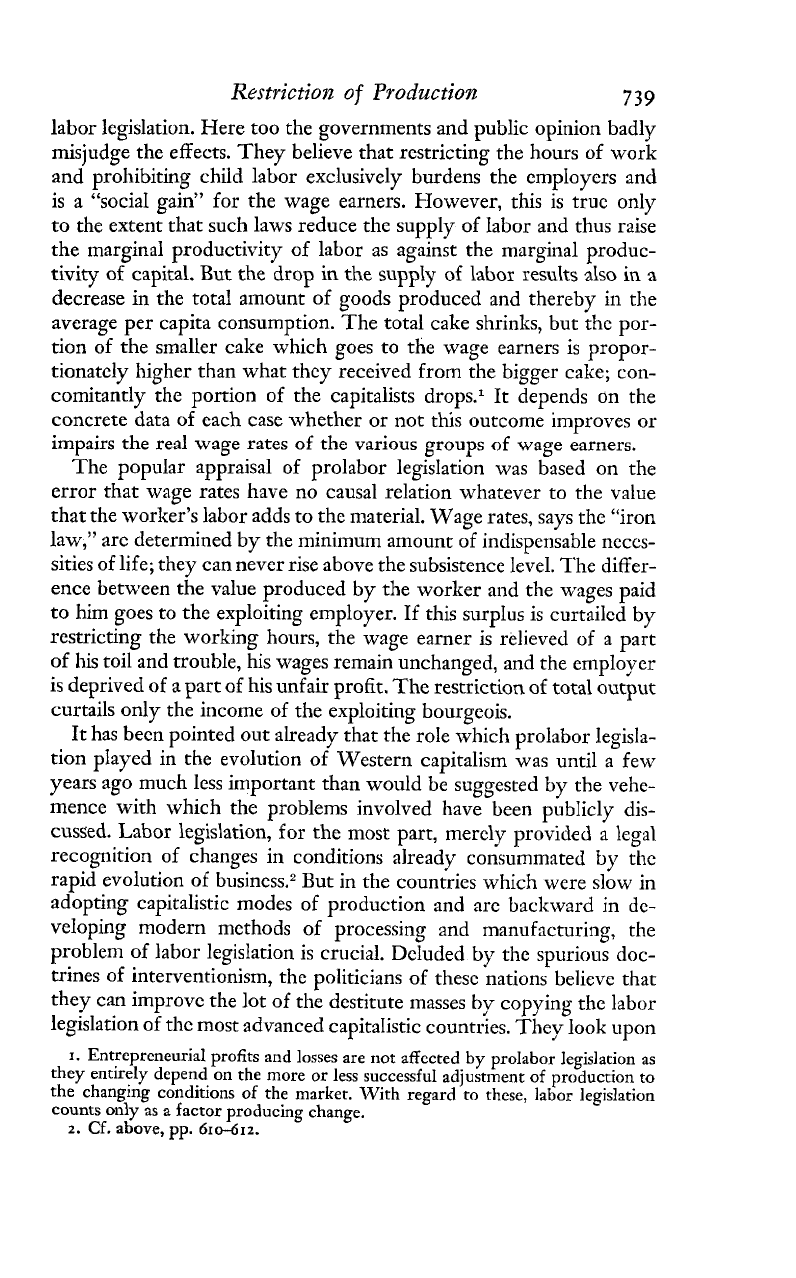
Restriction
of
Production
739
labor legislation. Here too the governments and public opinion badly
misjudge the effects. They believe that restricting the hours of work
and prohibiting child labor exclusively burdens the employers and
is a "social gain" for the wage earners. However, this is true only
to the extent that such laws reduce the supply of labor and thus raise
the marginal productivity of labor as against the marginal produc-
tivity of capital. But the drop in the supply of labor results also
in
a
decrease in the total amount of goods produced and thereby in the
average per capita consumption. The total cake shrinks, but the por-
tion of the smaller cake which goes to the wage earners is propor-
tionately higher than what they received from the bigger cake; con-
comitantly the portion of the capitalists drops1
It
depends on the
concrete data of each case whether or not this outcome improves or
impairs the real wage rates of the various groups
of
wage earners.
The popular appraisal of prolabor legislation was based on the
error that wage rates have no causal relation whatever to the value
that the worker's labor adds to the material. Wage rates, says the "iron
law," are determined by the minimum amount of indispensable neccs-
sities of life; they can never rise above the subsistence level. The differ-
ence between the value produced by the worker and the wages paid
to him goes to the exploiting employer. If this surplus is curtailed by
restricting the working hours, the wage earner is relieved of a part
of his toil and trouble, his wages remain unchanged, and the employer
is deprived of a part of his unfair profit. The restriction of total output
curtails only the income of the exploiting bourgeois.
It has been pointed out already that the role which prolabor legisla-
tion pIayed in the evolution of Western capitalism was until a few
years ago much less important than would be suggested by the vehe-
mence with which the problems involved have been publicly dis-
cussed. Labor legislation, for the most part, merely provided a legal
recognition of changes in conditions already co~surnmated
by
the
rapid evolution of b~siness.~ But in the coun&es which were slow in
adopting capitalistic modes of production and are backward in de-
veloping modern methods of processing and manufacturing, the
problem of labor legislation is crucial. Deluded by the spurious doc-
trines of interventionism, the politicians of these nations believe that
they can improve the lot of the destitute masses by copying the labor
legislation of the most advanced capitaIistic countries. They look upon
I.
Entrepreneurial profits and losses are riot affected by prolabor legislation as
they entirely depend on the more or less successful adjustment of production to
the changing conditions
of
the market. With regard to these, labor legislation
counts
only
as
a
factor producing change.
2.
Cf.
above,
pp.
610-612.
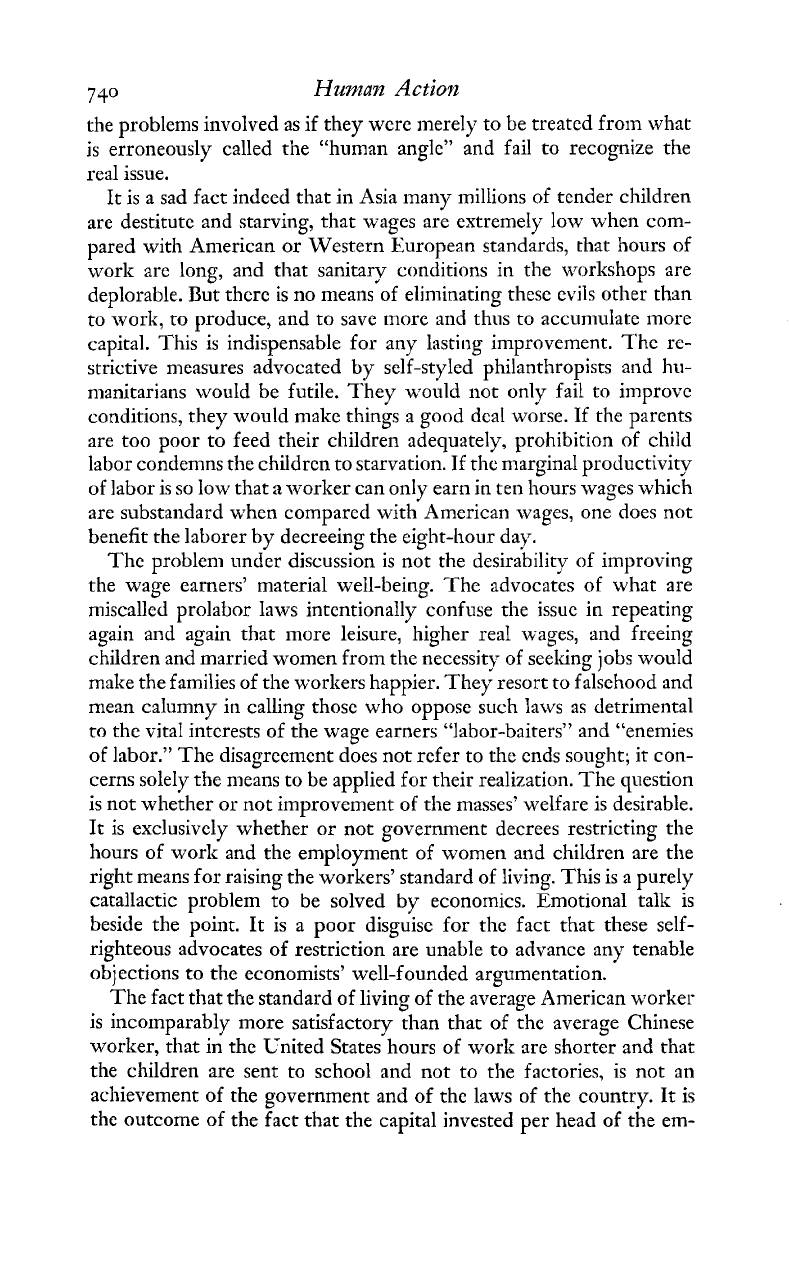
740
Human
Actiorz
the problems involved as if they were merely to be treated from what
is erroneously called the "human angle" and fail to recognize the
real issue.
It is a sad fact indeed that in Asia many millions of tender children
are destitute and starving, that wages arc extremely low when com-
pared with American or Western European standards, that hours of
work are long, and that sanitary conditions in the workshops are
deplorable. 13ut there is no means of eliminating these evils other than
to work, to produce, and to save tnore and thus to accumulate more
capital. This is indispensable for any lasting improvement. The re-
strictive measures advocated by self-styled philanthropists and hu-
manitarians would be futile. They would not only fail to improve
conditions, they would make things a good deal worse. If the parents
are too poor to feed their children adequately, prohibition of child
labor condemns the children to starvation. If the marginal productivity
of labor is so low that a worker can only earn in ten hours wages which
are substandard when compared with American wages, one does not
benefit the laborer by decreeing the eight-hour day.
The problem under discussion is not the desirability of improving
the wage earners' material well-being. Thc advocates of what are
miscalled prolabor laws intentionally confuse the issue in repeating
again and again that more leisure, higher real wages, and freeing
children and married women from the necessity of seeking jobs would
make the families of the workers happier. They resort to falsehood and
mean calumny in calling those who oppose such laws as detrimental
to the vital interests of the wage earners "labor-baiters" and "enemies
of labor." The disagreement does not refer to the ends sought; it con-
cerns solely the means to be applied for their realization. The question
is not whether or not improvement of the masses' welfare is desirable.
It is cxclusivcly whether or not government decrees restricting the
hours of work and the employment of women and children are the
right means for raising the workers' standard of living. This is a purely
cataiiactic probiem to be soived by economm. Emotionai taik is
beside the point. It is a poor disguise for the fact that these self-
righteous advocates of restriction are unable to advance any tenable
objections
to
the economists' well-founded argumentation.
The fact that the standard of living of the average American worker
is incomparably more satisfactory than that of the average Chinese
worker, that in the Cnited States hours of work are shorter and that
the children are sent to school and not to the factories, is not
an
achievement of the government and of the laws of the country. It is
the outcome of the fact that the capital invested per head of the em-
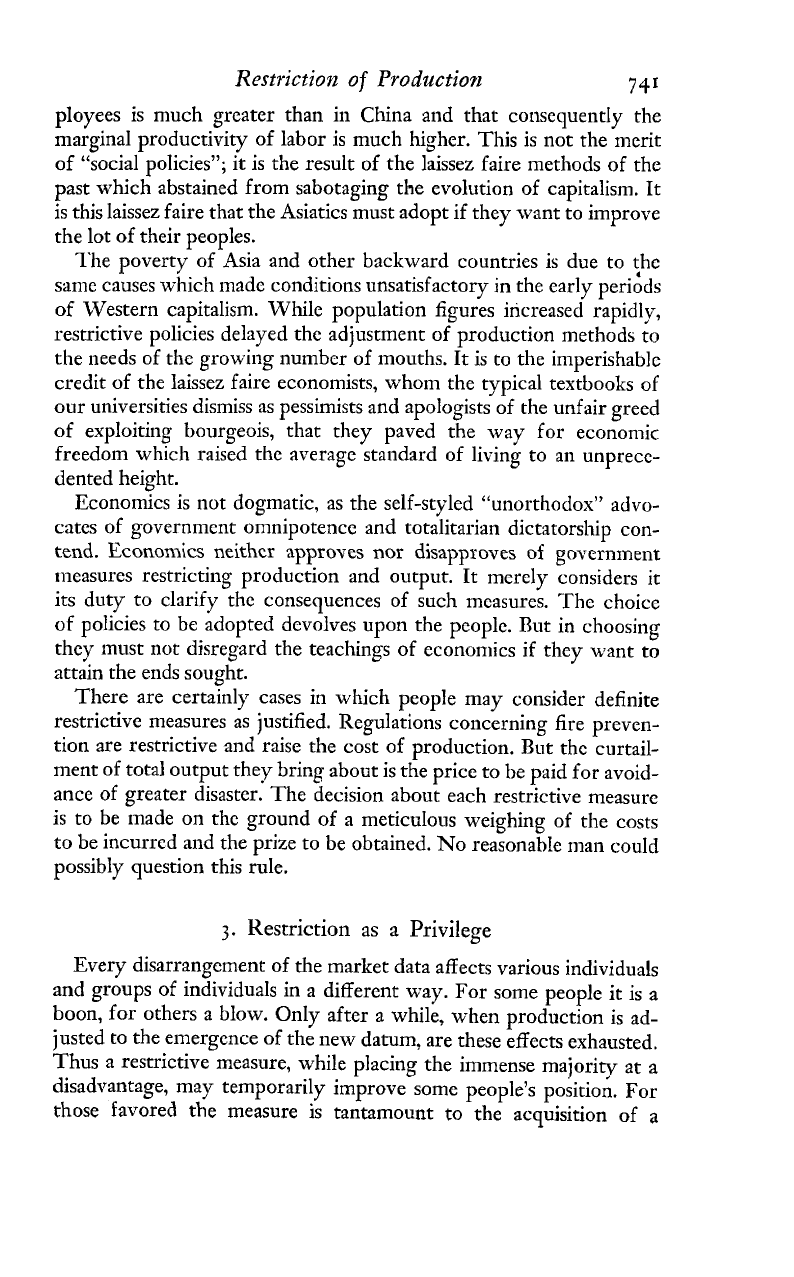
Restriction of Production
741
ployees is much greater than in China and that consequently the
marginal productivity of labor is much higher. This is not the merit
of "social policies"; it is the result of the laissez faire methods of the
past which abstained from sabotaging the evolution of capitalism. It
is
this laissez faire that the Asiatics must adopt if they want to improve
the lot of their peoples.
The poverty of Asia and other backward countries is due to :he
same causes which made conditions unsatisfactory in the early periods
of
Western capitalism. While population figures increased rapidly,
restrictive policies delayed the adjustment of production methods to
the needs of the growing number of mouths. It is to the irnperishablc
credit of the laissez faire economists, whom the typical textbooks of
our universities dismiss as pessimists and apologists of the unfair greed
of exploiting bourgeois, that they paved the way for economic
freedom which raised the average standard of living to an unprecc-
dented height.
Economics is not dogmatic, as the self-styled "unorthodox" advo-
cates of government omnipotence and totalitarian dictatorship con-
tend.
Economics neither approves nor disapproves
of
government
measures restricting production and output. It merely considers it
its duty to clarify the consequences of such measures. The choice
of policies to be adopted devolves upon the people. But in choosing
they must not disregard the teachings of economics if they want to
attain the ends sought.
There are certainly cases in which people may consider definite
restrictive measures as justified. Regulations concerning fire preven-
tion are restrictive and raise the cost of production. Rut the curtail-
ment of total output they bring about is the price to be paid for avoid-
ance
of
greater disaster. The decision about each restrictive measure
is to be made on the ground of a meticulous weighing of the costs
to be incurred and the prize to be obtained. No reasonable man could
possibly question this rule.
3.
Restriction
as
a
Privilege
Every disarrangement of the market data affects various individuals
and groups of individuals in a different way. For some people it is a
boon, for others a blow. Only after a while, when production is ad-
justed to the emergence of the new datum, are these effects exhausted.
Thus a restrictive measure, while placing the immense majority at a
disadvantage, may temporarily improve some people's position. For
those favored the measure is tantamount to the acquisition
of
a
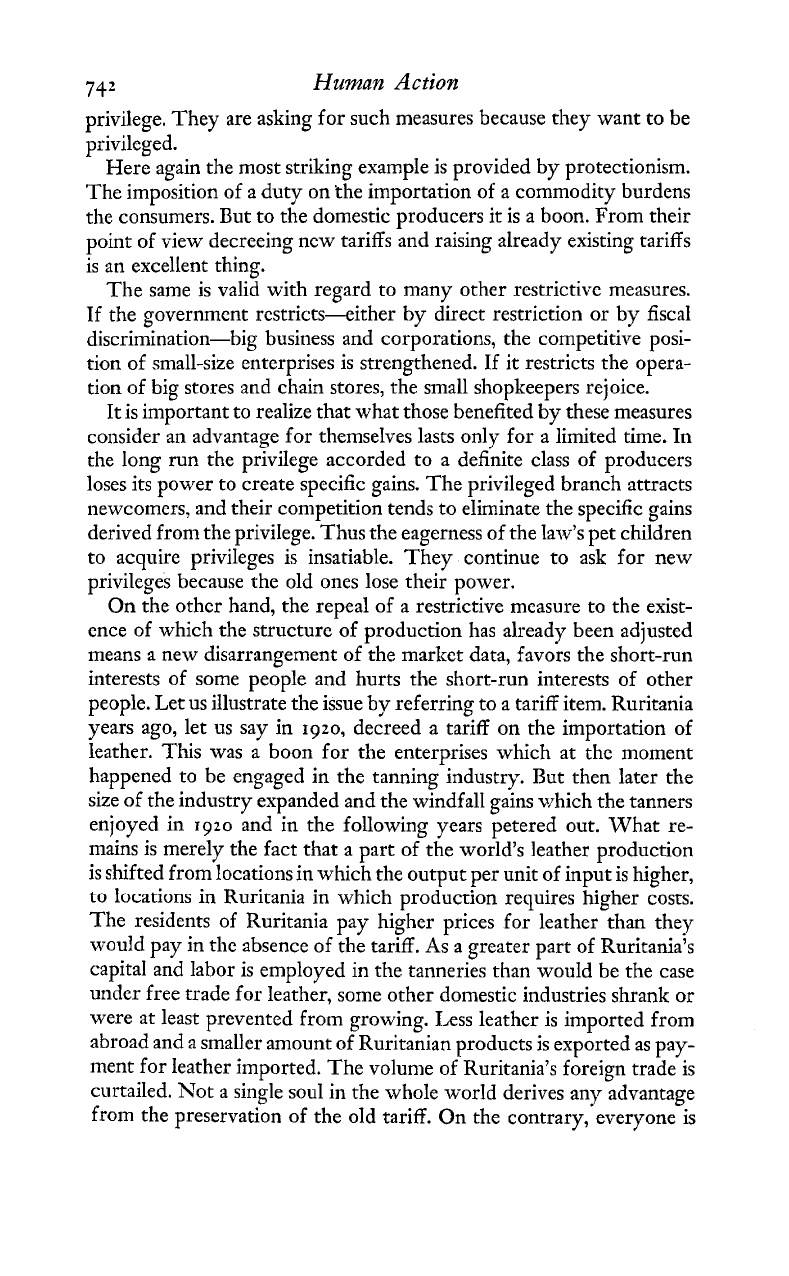
742
Human
Action
privilege. They are asking for such measures because they want to be
privileged.
Here again the most striking example is provided by protectionism.
The imposition of a duty on the importation of a commodity burdens
the consumers. But to the domestic producers it is a boon. From their
point of view decreeing new tariffs and raising already existing tariffs
is an excellent thing.
The same is valid with regard to many other restrictive measures.
If the government restricts--either by direct restriction or by fiscal
discrimination-big business and corporations, the competitive posi-
tion of small-size enterprises is strengthened. If it restricts the opera-
tion of big stores and chain stores, the small shopkeepers rejoice.
It is important to realize that what those benefited by these measures
consider an advantage for themselves lasts only for a limited time. In
the long run the privilege accorded to a definite class of producers
loses its power to create specific gains. The privileged branch attracts
newcomers, and their con~petition tends to eliminate the specific gains
derived from the privilege. Thus the eagerness of the law's pet children
to acquire privileges is insatiable. They continue to ask for new
privileges because the old ones lose their power.
On
the other hand, the repeal of a restrictive measure to the exist-
ence of which the structure of production has already been adjusted
means a new disarrangement of the market data, favors the short-run
interests of some people and hurts the short-run interests of other
people. Let us illustrate the issue by referring to a tariff item. Ruritania
years ago, let us say in 1920, decreed a tariff on the importation of
leather. This was a boon for the enterprises which at the moment
happened to be engaged in the tanning industry. But then later the
size of the industry expanded and the windfall gains which the tanners
enjoyed in 1920 and in the following years petered out. What re-
mains is merely the fact that a part of the world's leather production
is shifted from locations in which the output per unit of input is higher,
to locaticions in Ruritania in which production requires higher costs.
The residents of Ruritania pay higher prices for leather than they
would pay in the absence of the tariff. As a greater part of ~uritania's
capital and labor is employed in the tanneries than would be the case
under free trade for leather, some other domestic industries shrank or
were at least prevented from growing. Less leather is imported from
abroad and a smaller amount of Ruritanian products is exported as pay-
ment for leather imported. The volun~e of Ruritania's foreign trade is
curtailed. hTot a single soul in the whole world derives any advantage
from the preservation of the old tariff. On the contrary, everyone is
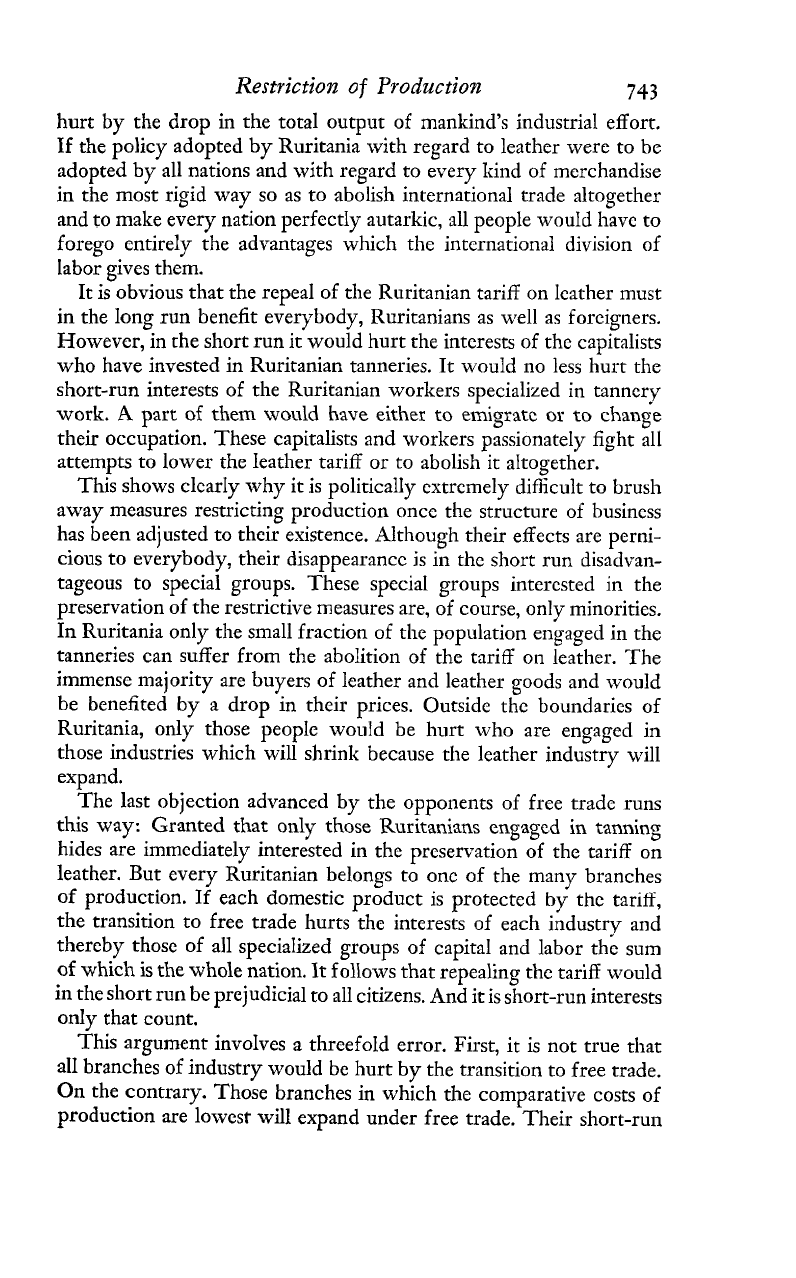
Restriction
of
Production
743
hurt by the drop in the total output of mankind's industrial effort.
If
the policy adopted by Ruritania with regard to leather were to be
adopted by all nations and with regard to every kind of merchandise
in the most rigid way so as to abolish international trade altogether
and to make every nation perfcctIy autarkic, all people wouId have to
forego entirely the advantages which the international division of
labor gives them.
It is obvious that the repeal of the Ruritanian tariff on leather must
in the long run benefit everybody, Ruritanians as well as foreigners.
However, in the short run it would hurt the interests of the capitalists
who have invested in Ruritanian tanneries. It would no less hurt the
short-run interests of the Ruritanian workers specialized in tannery
work.
A
part of them would have either to emigrate or to change
their occupation. These capitalists and workers passionately fight all
attempts to lower the leather tariff or to abolish it altogether.
This shows clearly why it is politically extremely difiicult to brush
away measures restricting production once the structure of business
has been adjusted to their existence. Although their effects are perni-
cious to everybody, their disappearance is in the short run disadvan-
tageous to special groups. These special groups intercsted in the
preservation of the restrictive measures are, of course, only minorities.
In Ruritania only the small fraction of the population engaged in the
tanneries can suffer from the abolition of the tariff on leather. The
immense majority are buyers of leather and leather goods and would
be benefited by a drop in their prices. Outside the boundaries of
Ruritania, only those people would be hurt who are engaged in
those industries which will shrink because the leather industry will
expand.
The last objection advanced by the opponents of free trade runs
this way: Granted that only those Ruritanians engaged in tanning
hides are immediately interested in the preservation of the tariff on
leather. But every Ruritanian belongs to one of the many branches
of production. If each domestic product is protected by the tariff,
the transition to free trade hurts the interests of each industry and
thereby those of all speciaIized groups of capital and labor the sum
of which
is
the whole nation.
It
follows that repealing the tariff would
in the short run be prejudicial to all citizens. And it is short-run interests
only that count.
This argument invoIves a threefold error. First, it is not true that
a11 branches of industry would be hurt by the transition to free trade.
On the contrary. Those branches in which the comparative costs of
production are lowest will expand under free trade. Their short-run
